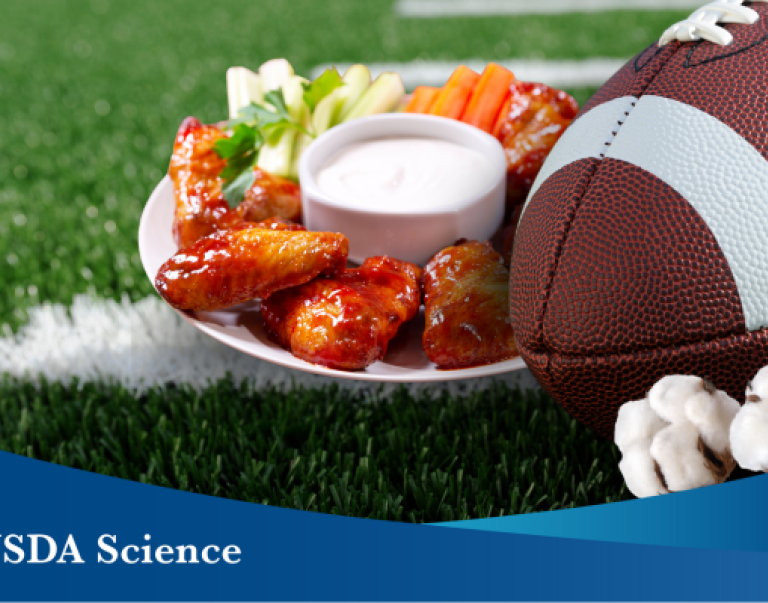WASHINGTON, Feb. 1, 2013 – USDA today announced the public comment period has opened on proposed new standards to ensure that children have access to healthy food options in school.
"Parents and teachers work hard to instill healthy eating habits in our kids, and these efforts should be supported when kids walk through the schoolhouse door," said Agriculture Secretary Tom Vilsack. "Good nutrition lays the groundwork for good health and academic success. Providing healthy options throughout school cafeterias, vending machines, and snack bars will complement the gains made with the new, healthy standards for school breakfast and lunch so the healthy choice is the easy choice for our kids."
The Healthy, Hunger-Free Kids Act of 2010 requires USDA to establish nutrition standards for all foods sold in schools -- beyond the federally-supported school meals programs. The "Smart Snacks in School" proposed rule, to be published soon in the Federal Register, is the first step in the process to create national standards. The new proposed standards draw on recommendations from the Institute of Medicine, existing voluntary standards already implemented by thousands of schools around the country, and healthy food and beverage offerings already available in the marketplace.
Highlights of USDA's proposal include:
- More of the foods we should encourage. Promoting availability of healthy snack foods with whole grains, low fat dairy, fruits, vegetables or protein foods as their main ingredients.
- Less of the foods we should avoid. Ensuring that snack food items are lower in fat, sugar, and sodium and provide more of the nutrients kids need.
- Targeted standards. Allowing variation by age group for factors such as beverage portion size and caffeine content.
- Flexibility for important traditions. Preserving the ability for parents to send in bagged lunches of their choosing or treats for activities such as birthday parties, holidays, and other celebrations; and allowing schools to continue traditions like occasional fundraisers and bake sales.
- Reasonable limitations on when and where the standards apply. Ensuring that standards only affect foods that are sold on school campus during the school day. Foods sold at an afterschool sporting event or other activity will not be subject to these requirements.
- Flexibility for state and local communities. Allowing significant local and regional autonomy by only establishing minimum requirements for schools. States and schools that have stronger standards than what is being proposed will be able to maintain their own policies.
- Significant transition period for schools and industry. The standards will not go into effect until at least one full school year after public comment is considered and an implementing rule is published to ensure that schools and vendors have adequate time to adapt.
The public is encouraged to review the proposal and to provide comments and information for consideration by USDA. The text of the proposed rule is available at http://www.fns.usda.gov/cga/020113-snacks.pdf . Once the rule is published in the Federal Register, which is expected next week, the public will be able to provide feedback through www.regulations.gov. USDA will seek public comment on the proposal for 60 days.
Earlier this week, the Centers for Disease Control and Prevention (CDC) issued a report that analyzed state policies for food and beverages served outside the school lunch line which noted that 39 states already have a state law, regulation or policy in place related to the sale or availability of snack foods and beverages in schools. In many cases, local level (district and school) policies and practices exceeded state requirements or recommendations. USDA's proposal would establish a national baseline of these standards, with the overall goal of improving the health and nutrition of our kids.
These proposed standards are part of a bi-partisan package of changes passed by Congress in 2010 designed to ensure that students have healthy options in school. Other parts of that package include updated nutrition standards for federally-subsidized school meals that provide children more fruits, vegetables, and whole grains; additional funding for schools to support improved meals; and guidance on stronger local wellness policies.
Collectively these policies will help combat child hunger and obesity and improve the health and nutrition of the nation's children; a top priority for the Obama Administration. The proposed rule announced today is an important component of First Lady Michelle Obama's Let's Move! initiative to combat the challenge of childhood obesity.
USDA's Food and Nutrition Service administers America's nutrition assistance programs including the National School Lunch and School Breakfast programs, the Summer Food Service Program, and Supplemental Nutrition Assistance Program, and the Special Supplemental Nutrition Program for Women, Infants, and Children (WIC). Together these programs make up the federal nutrition safety net.
For more information on the proposed rule, visit: http://www.fns.usda.gov/cga/020113-qas.pdf
#
USDA is an equal opportunity provider and employer. To file a complaint of discrimination, write: USDA, Office of the Assistant Secretary for Civil Rights, Office of Adjudication, 1400 Independence Ave., SW, Washington, DC 20250-9410 or call (866) 632-9992 (Toll-free Customer Service), (800) 877-8339 (Local or Federal relay), (866) 377-8642 (Relay voice users).



